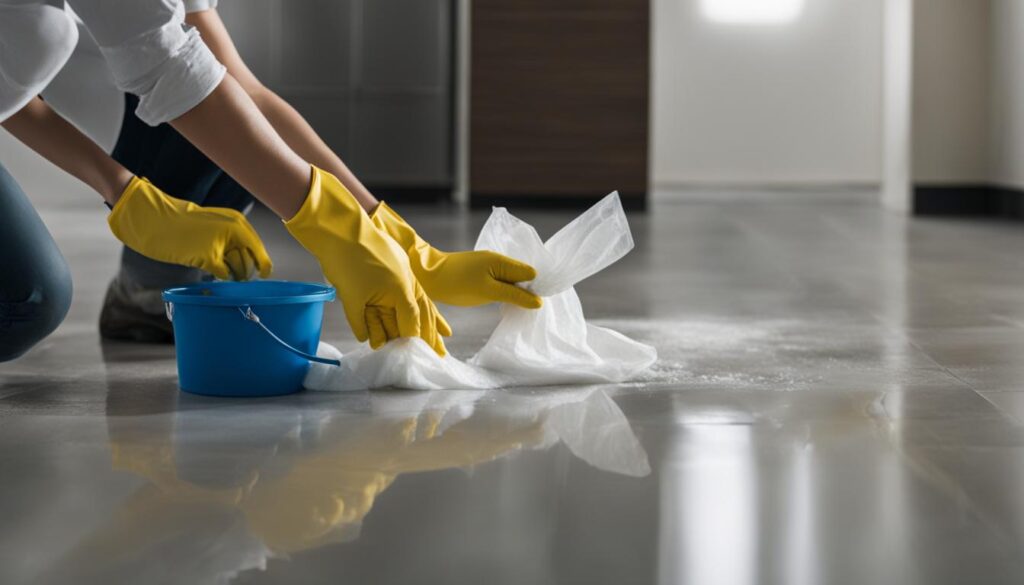Your puppy throwing up can be quite normal, but it’s important to understand the reasons behind it. Some common causes include dietary indiscretion, teething, eating spoiled food, overeating, eating something they shouldn’t have, worms, and certain illnesses like Canine Parvovirus. By understanding the reasons behind your puppy’s vomiting, you can take the necessary steps to alleviate their discomfort and prevent it from happening again.
Key Takeaways:
- Puppy vomiting can have various causes, including dietary indiscretion, teething, eating spoiled food, overeating, ingesting foreign objects, worms, and certain illnesses.
- Monitor your puppy’s behavior and prevent them from ingesting potential hazards.
- Provide appropriate teething toys to alleviate discomfort and prevent upset stomach.
- Store your puppy’s food properly and keep their bowls clean to prevent spoilage and bacterial growth.
- Regularly deworm your puppy and consult a veterinarian if you suspect worm infestations.
Dietary Indiscretion: A Common Cause of Puppy Vomiting
Dietary indiscretion is a common cause of puppy vomiting. Puppies are naturally curious and may explore their surroundings with their mouths, often ingesting things they shouldn’t have. This can include garbage, plants, or even their own toys. Additionally, puppies have a tendency to overeat or gobble their food too quickly, which can also lead to vomiting.
| Cause | Prevention |
|---|---|
| Eating something they shouldn’t have | Keep potential hazards out of your puppy’s reach and monitor their behavior closely. |
| Overeating or eating too quickly | Feed your puppy small, regular meals and consider using slow feeder bowls to prevent them from gulping down their food. |
To prevent dietary indiscretion-related vomiting, it’s crucial to supervise your puppy and create a safe environment free from potential hazards. This includes keeping harmful substances out of their reach and providing appropriate toys for them to chew on instead. Additionally, feeding them small, regular meals and monitoring their eating habits can help prevent overeating and vomiting.
Remember, prevention is key when it comes to dietary indiscretion and puppy vomiting. By being proactive and creating a safe environment for your puppy, you can minimize the risk of them ingesting harmful substances and experiencing digestive issues.
By addressing the common cause of dietary indiscretion as a part of puppy vomiting, you can better understand the factors that contribute to your puppy’s discomfort. Taking preventive measures and monitoring your puppy’s behavior can help reduce the occurrence of vomiting episodes and keep them healthy and happy.
Teething and Puppy Vomiting
Teething can be a challenging phase for both puppies and their owners. As your puppy goes through this natural process, they may experience discomfort and exhibit certain behaviors, including vomiting. Teething can cause puppies to have an upset tummy, leading to vomiting and even diarrhea. It’s important to understand how teething can affect your puppy and take steps to alleviate their discomfort.
During teething, puppies may have a decreased appetite and an increased urge to chew on objects. This chewing helps relieve the pain and discomfort in their gums. However, if your puppy ingests objects that are not meant to be chewed, it can lead to an upset stomach and vomiting. To prevent this, provide appropriate teething toys for your puppy to chew on. These toys should be safe and specifically designed for teething puppies. Avoid giving them objects that can break into small pieces and pose a choking hazard.
In addition to providing teething toys, it’s essential to monitor your puppy’s chewing habits. If you notice your puppy chewing on inappropriate objects, gently redirect their attention to a safe toy. This will help prevent them from ingesting anything that may cause vomiting. Supervision is key during this stage, as it allows you to intervene if your puppy starts chewing on something they shouldn’t.
| Signs of Teething in Puppies | Ways to Alleviate Discomfort |
|---|---|
|
|
Teething can be a challenging time for puppies, but it’s a normal part of their development. By understanding the impact teething can have on your puppy’s digestive system, you can take proactive measures to ensure their comfort and well-being. Remember to provide appropriate teething toys, monitor their chewing habits, and seek veterinary advice if you have any concerns about their health.
Teething and puppy vomiting are often interconnected, but with proper attention and care, you can help your puppy navigate this phase more smoothly. By providing them with appropriate toys and monitoring their chewing habits, you can prevent them from ingesting objects that may lead to an upset stomach and vomiting. Remember, teething is temporary, and your puppy will soon have a healthy set of adult teeth.

Spoiled Food and Vomiting in Puppies
When it comes to puppy vomiting, one of the common culprits is spoiled food. If your puppy’s food has been left out and exposed to air, it can quickly become rancid, leading to tummy troubles. This is especially true for dry food, which can go bad if not stored properly, but wet food can also spoil if not refrigerated. It’s essential to take care of your puppy’s food storage and freshness to prevent vomiting episodes.
To ensure your puppy’s food stays fresh, make sure to seal the container tightly after each use. Store the food in a cool and dry place, away from direct sunlight. Check the expiration dates on the packaging and discard any old or expired food. Regularly cleaning your puppy’s food and water bowls can also help prevent bacterial growth that could potentially lead to vomiting.
| Tips for preventing spoiled food and puppy vomiting |
|---|
| Seal the food container tightly to maintain freshness. |
| Store the food in a cool and dry place away from sunlight. |
| Check the expiration dates and discard any old or expired food. |
| Regularly clean your puppy’s food and water bowls to prevent bacterial growth. |
By taking these precautions, you can reduce the risk of your puppy consuming spoiled food and experiencing vomiting as a result. Remember to always prioritize your puppy’s health and well-being by providing them with fresh and appropriate food.
Ingesting Foreign Objects and Puppy Vomiting
Puppies are curious creatures, and their curiosity often leads them to explore the world around them with their mouths. Unfortunately, this can sometimes result in them ingesting foreign objects that they shouldn’t. If your puppy has swallowed something they shouldn’t have, it can lead to vomiting as their body tries to expel the object.
Common foreign objects that puppies may ingest include small toys, socks, hair ties, or even small items like coins. These objects can cause irritation or blockage in the digestive system, leading to vomiting. It’s essential to keep a close eye on your puppy and prevent them from accessing objects that could be harmful.
If you suspect that your puppy has swallowed a foreign object and they start vomiting, it’s important to monitor their behavior and contact your veterinarian for advice. They may recommend bringing your puppy in for an examination to determine if any intervention or treatment is necessary.
Preventing Foreign Object Ingestion
To prevent your puppy from ingesting foreign objects, it’s important to puppy-proof your home. Keep small items out of their reach and ensure that all toys and objects they interact with are safe and appropriate for their size. Supervise your puppy during playtime and discourage them from chewing on or swallowing objects that aren’t intended for them.
Additionally, providing your puppy with plenty of appropriate chew toys can help redirect their chewing behavior and satisfy their natural urge to chew. Choose toys that are durable and specifically designed for teething puppies. Regularly inspect their toys for any signs of wear or damage that could potentially become a choking hazard.
By taking these precautions and closely monitoring your puppy’s behavior, you can prevent them from ingesting foreign objects and reduce the risk of vomiting and other potential health issues.
| Foreign Objects to Watch Out For | Potential Harm or Risk |
|---|---|
| Small toys | Choking hazard, intestinal blockage |
| Socks or clothing | Intestinal blockage |
| Hair ties or rubber bands | Choking hazard, intestinal blockage |
| Coins or small objects | Choking hazard, intestinal blockage |
Remember, prevention is key when it comes to foreign object ingestion in puppies. By keeping a close eye on your puppy and creating a safe environment for them, you can minimize the risk of vomiting and other potential health complications.

Worms and Puppy Vomiting
Another common cause of puppy vomiting is worms. Internal parasites like intestinal worms can cause nausea and vomiting in puppies. If your puppy has worms, they may also have other symptoms such as diarrhea, weight loss, and a pot-bellied appearance. It’s important to regularly deworm your puppy to prevent infestations and reduce the risk of vomiting. Consult with your veterinarian for the appropriate deworming schedule and medications for your puppy.
In addition to intestinal worms, the medications used to treat them can also cause nausea and vomiting as a side effect. This is a temporary reaction and should subside once the medication has been completed. However, if your puppy continues to vomit or shows signs of distress after deworming, it’s important to seek veterinary advice to ensure their well-being.
Preventing worm infestations in puppies is crucial for their overall health. Keep your puppy’s living area clean and free from feces, as worms can be transmitted through contaminated soil. Regularly clean and disinfect their food and water bowls to minimize the risk of worm eggs or larvae. Additionally, practicing good hygiene by washing your hands thoroughly after handling your puppy or cleaning up after them can help prevent the spread of worms.
The Importance of Regular Veterinary Check-ups
Scheduling regular veterinary check-ups for your puppy is essential for their overall health and well-being. During these visits, your veterinarian can perform fecal tests to check for any signs of intestinal worms and recommend the appropriate deworming protocols. They can also provide guidance on preventive measures and answer any questions you may have regarding your puppy’s digestive health.
| Signs of Worm Infestation in Puppies | Preventive Measures |
|---|---|
| Vomiting | Deworm your puppy regularly |
| Diarrhea | Clean living area and food bowls regularly |
| Pot-bellied appearance | Practice good hygiene and wash hands thoroughly |
When to Worry About Puppy Vomiting
While occasional vomiting in puppies may not be a cause for concern, there are certain signs that indicate a need for veterinary attention. It’s important to be aware of these signs so you can take appropriate action when necessary.
- Persistent Vomiting: If your puppy continues to vomit repeatedly, even after their stomach is empty, it’s time to seek veterinary care. This could be a sign of an underlying condition that requires medical treatment.
- Other Clinical Signs: Pay attention to other symptoms that your puppy may be experiencing in addition to vomiting. Lethargy, loss of appetite, diarrhea, or a raised temperature are all potential indicators of a more serious problem.
- Blood or Dark Material in Vomit: If you notice blood or dark, coffee-ground-like material in your puppy’s vomit, it’s important to consult with your vet immediately. This could be a sign of gastrointestinal bleeding or other serious issues.
Remember, it’s always better to be safe than sorry when it comes to your puppy’s health. If you’re unsure or concerned about your puppy’s vomiting, don’t hesitate to reach out to your veterinarian for guidance and support.
Tips for Dealing with Puppy Vomiting
Dealing with puppy vomiting can be concerning, but there are steps you can take to help alleviate their discomfort and prevent it from happening again. Here are some useful tips to keep in mind:
1. Clean up promptly:
When your puppy vomits, it’s important to clean up the mess promptly to maintain a clean and hygienic environment. Use paper towels or disposable gloves to remove the vomit and dispose of it properly. Clean the affected area with a pet-safe cleaner to eliminate any lingering odors.
2. Prevent spoilage:
One of the causes of puppy vomiting is spoiled food. To prevent this, store your puppy’s food properly. Dry food should be kept in a cool, dry place in a sealed container, while wet food should be refrigerated after opening. Regularly check expiration dates and ensure the freshness of the food before feeding it to your puppy.
3. Feed on a schedule:
Establishing a regular feeding schedule can help prevent your puppy from overeating or gobbling their food too quickly, which can lead to vomiting. Divide their daily food portion into several smaller meals throughout the day. If your puppy tends to eat too fast, consider using a slow feeder bowl or food puzzle toy to slow down their eating pace.
4. Clean bowls:
Regularly clean your puppy’s food and water bowls to prevent bacterial growth. Use warm, soapy water and rinse them thoroughly. Avoid using harsh cleaning agents or bleach as they can leave residual smells or flavors that may discourage your puppy from eating or drinking.
Remember, if your puppy continues to vomit or exhibits other concerning symptoms, it’s best to seek veterinary advice for a proper diagnosis and treatment. By taking these proactive measures, you can help your puppy stay healthy and minimize the occurrence of vomiting episodes.

Conclusion
Understanding why your puppy throws up is crucial for their overall health and well-being. By identifying the causes, taking preventive measures, and seeking veterinary advice when necessary, you can ensure your puppy’s digestive system stays healthy.
Keep an eye out for signs of an upset stomach in puppies, such as persistent vomiting, lethargy, or vomiting blood or dark material. If you notice any of these symptoms, it’s essential to seek veterinary care promptly.
Remember to monitor your puppy’s behavior, provide appropriate care, and consult with your vet if you have any concerns. With the right approach, you can help your puppy avoid unnecessary vomiting and keep them happy and healthy.
FAQ
What are some common causes of puppy vomiting?
Common causes of puppy vomiting include dietary indiscretion, teething, eating spoiled food, overeating, eating something they shouldn’t have, worms, and certain illnesses like Canine Parvovirus.
Why do puppies vomit when they eat something they shouldn’t?
Puppies are curious and may ingest objects they shouldn’t. Vomiting is their natural way of purging the foreign object from their system.
How can teething lead to puppy vomiting?
During the teething process, puppies may have a decreased appetite and chew on objects to relieve discomfort. This can lead to an upset stomach and vomiting.
Can spoiled food cause puppies to vomit?
Yes, if a puppy’s food is left out and exposed to air, it can become spoiled and lead to vomiting. Properly storing and checking your puppy’s food is important to prevent this.
What should I do if my puppy vomits after eating something they shouldn’t?
It’s important to monitor your puppy and prevent them from ingesting anything that could cause harm. If they vomit, clean it up promptly and consult with your veterinarian if there are any concerns.
Can worms cause puppies to vomit?
Yes, both internal parasites like intestinal worms and deworming medications can cause nausea and vomiting in puppies. Regular deworming and preventive medication are necessary to reduce the risk of worm infestations.
When should I be concerned about my puppy’s vomiting?
If your puppy is experiencing persistent vomiting, has other signs of illness like lethargy or a raised temperature, or vomits blood or dark material, it’s essential to seek veterinary care.
How can I prevent puppy vomiting and alleviate their discomfort?
To prevent puppy vomiting, store food properly, feed them on a schedule, provide clean bowls, and monitor their behavior. If they have a tummy bug, you can offer them a bland diet. If vomiting persists or is accompanied by concerning symptoms, consult with your veterinarian.
How can I understand and take care of my puppy’s vomiting?
By understanding the reasons behind your puppy’s vomiting and taking preventive measures, you can help them avoid unnecessary vomiting. Monitor their behavior, provide appropriate care, and consult with your veterinarian if you have any concerns.




